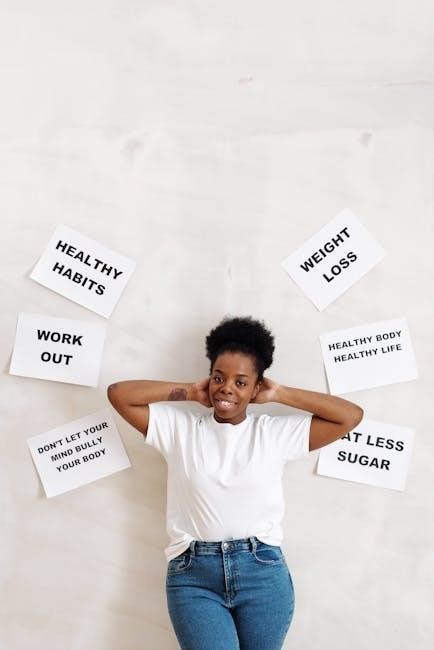why women deserve less pdf

The phrase “Why Women Deserve Less” sparks debate, often used satirically to critique gender inequality․ It highlights disparities in pay, rights, and opportunities, challenging societal norms and encouraging reflection on equality․
Understanding the Context of the Title
The title “Why Women Deserve Less” is often interpreted as a satirical or provocative statement aimed at sparking discussions about gender equality․ It challenges societal norms by inverting common narratives about women’s rights, prompting reflection on systemic inequalities․ In some contexts, it appears in media, such as book titles or online debates, to critique gender disparities․ The phrase is not meant to be taken literally but serves as a tool to highlight ongoing struggles for equality, encouraging dialogue and awareness about the barriers women face in achieving equal opportunities and recognition․
The Satirical and Provocative Nature of the Phrase
The phrase “Why Women Deserve Less” is primarily used as satire to provoke thought on gender equality․ It employs irony to highlight real-world disparities, such as pay gaps and workplace discrimination, often sparking intense debates․ By flipping expectations, it challenges stereotypes and encourages critical reflection․ This approach aims to expose underlying biases and push for change․ The phrase’s provocative nature ensures it captures attention, making it a powerful tool for starting conversations about gender equity and the challenges women face in achieving equal opportunities․

Historical Perspectives on Gender Disparities
Historically, gender inequalities have roots in societal norms, limiting women’s rights and opportunities․ Past disparities in voting, education, and workplace participation highlight systemic barriers women faced, shaping modern discussions․
Women’s Rights and Equality in the Past
Historically, women’s rights were severely limited, with systemic barriers preventing equality․ From voting restrictions to lack of property rights, women faced widespread discrimination․ The suffrage movement in the early 20th century marked a turning point, securing voting rights in many countries․ However, workplace inequality persisted, with women often excluded from certain professions and paid less than men․ Education and legal rights were also restricted, reflecting deeply entrenched gender biases․ These historical injustices laid the groundwork for modern feminist movements, emphasizing the need for continued advocacy to address lingering disparities and achieve true gender equality․
Societal Norms and Gender Roles
Societal norms and gender roles have historically shaped perceptions of women’s worth, often limiting their opportunities and reinforcing inequalities․ Traditional norms have confined women to domestic roles, discouraging their participation in public and professional spheres․ These roles have been used to justify unequal treatment, such as lower pay and restricted access to resources․ The impact of these norms is evident in the systemic disparities women face today․ Challenging these deeply ingrained norms is crucial for achieving true gender equality and ensuring women have equal opportunities to thrive in all aspects of life․

Systemic Inequalities and Challenges Faced by Women
Systemic inequalities persist, with women facing gender pay gaps, workplace discrimination, and limited opportunities․ These challenges are deeply rooted in societal structures, hindering their progress and equality․
Gender Pay Gaps and Workplace Discrimination
Globally, women face significant disparities in earnings, with studies indicating they earn approximately 24% less than men for similar work․ This pay gap persists across industries, often exacerbated by workplace discrimination․ Women are frequently overlooked for promotions, undervalued in their roles, and subjected to unfair treatment․ Discrimination extends to hiring practices, with biases influencing decisions․ These systemic issues perpetuate inequality, limiting women’s career advancement and financial independence․ Addressing these challenges requires policies promoting transparency, equal pay, and accountability to dismantle deeply ingrained biases and create equitable workplaces․
Lack of Representation in Leadership Roles
Women remain underrepresented in leadership roles across industries, with only a fraction holding executive or board positions․ This disparity stems from systemic barriers, including unconscious bias and stereotyping․ Research shows that women face greater scrutiny and higher standards for advancement․ Such underrepresentation limits diverse decision-making and perpetuates gender inequality․ Efforts to address this issue include mentorship programs and policies promoting gender diversity․ Increasing female leadership not only fosters equality but also enhances organizational innovation and effectiveness, making it a critical step toward a more inclusive society․
The Role of Education and Awareness
Education and awareness are crucial in challenging stereotypes and promoting gender equality․ They empower individuals to recognize and address systemic inequalities, fostering inclusive and equitable societies․
Empowering Women Through Education
Education plays a pivotal role in empowering women, equipping them with knowledge and skills to challenge societal norms․ Access to quality education enables women to break free from stereotypes, fostering personal and professional growth․ By addressing gender disparities in educational opportunities, societies can cultivate a more equitable future․ Satirical works, like those referencing “Why Women Deserve Less,” often highlight systemic inequalities, urging reflection on gender roles․ Education not only enhances individual capabilities but also strengthens communities, driving progress toward gender equality and social justice․ It is a cornerstone for dismantling misconceptions and building a more inclusive world․

Breaking Stereotypes and Misconceptions

Challenging stereotypes is crucial for advancing gender equality․ The phrase “Why Women Deserve Less” often serves as satire to expose deep-rooted biases․ By questioning these notions, society can dismantle misconceptions about women’s capabilities and roles․ Education and awareness campaigns play a vital role in reshaping perceptions, promoting inclusivity․ Addressing these stereotypes fosters an environment where women can thrive without being limited by outdated beliefs․ It encourages a shift toward recognizing individual potential over gender-based assumptions, ultimately contributing to a more equitable and progressive society․
Modern Interpretations and Debates
The phrase “Why Women Deserve Less” is often reinterpreted in modern discourse, sparking debates about equality and gender roles․ Social media amplifies these discussions, challenging outdated norms and fostering dialogue on women’s rights and societal expectations․
The Impact of Social Media on Gender Discussions
Social media has become a powerful platform for discussing gender issues, including the provocative phrase “Why Women Deserve Less․” Online debates often amplify conversations about equality, challenging stereotypes and fostering dialogue․ Platforms like Reddit and Amazon reviews highlight how satire and provocation can spark reflection on gender disparities․ However, these discussions sometimes lead to misinterpretation, emphasizing the need for nuanced understanding․ Social media’s role in modern discourse underscores its ability to both unite and divide, making it a double-edged sword in the fight for gender equity and awareness․
The Role of Satire in Addressing Gender Issues
Satire plays a crucial role in addressing gender issues by using humor and irony to highlight inequalities․ The phrase “Why Women Deserve Less” is often employed satirically to provoke dialogue about systemic gender disparities․ By challenging societal norms through exaggerated or provocative statements, satire encourages critical thinking and reflection․ It can amplify marginalized voices and bring attention to overlooked issues, fostering a deeper understanding of gender equity․ However, satire’s effectiveness depends on its audience’s ability to discern its intent, making it a powerful yet delicate tool in the conversation about gender equality and justice․
Equality is essential for a fair society, ensuring women have equal opportunities, rights, and representation․ Empowering women challenges stereotypes, fostering a balanced and inclusive world for all․
Why Women Deserve Equal Opportunities
Equal opportunities for women are crucial for fostering a just and progressive society․ Historically, women have faced systemic inequalities in education, employment, and leadership roles․ By ensuring equal access to resources and decision-making processes, women can contribute fully to economic and social development․ Gender equality not only benefits women but also strengthens families, communities, and nations․ Empowering women challenges stereotypes and promotes inclusivity, creating a balanced world where everyone thrives․ It is essential to address disparities in pay, representation, and rights to achieve true equality and unlock the full potential of half the global population․
A Call to Action for Gender Equity
Achieving gender equity requires collective effort and intentional actions․ Advocating for policies that promote equal pay, representation, and opportunities is essential․ Education plays a vital role in breaking stereotypes and empowering women․ Encouraging open dialogues and challenging biases can foster inclusivity․ Individuals, organizations, and governments must collaborate to dismantle systemic barriers․ By supporting women’s leadership and addressing discrimination, we can create a fairer society․ Every step toward gender equity benefits everyone, driving progress and prosperity for all․ The time to act is now, ensuring future generations inherit a world where equality is the norm․





